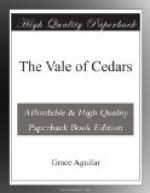“The principles of liberty seem to have been better understood, by the Castilians than by any other people in Europe. They had acquired more liberal notions with respect to their own rights and privileges. They had formed more bold and generous sentiments concerning government, and discovered an extent of political knowledge to which the English themselves did not attain till nearly a century afterwards.”
When we compare this state of things with the misery and anarchy pervading Castile before the accession of Isabella, we may have some idea of the influence of her vigorous measures, and personal character, on the happiness and freedom of her subjects. The laws indeed existed before, but they wanted the wisdom and moderation of an enlightened Sovereign, to give them force and power to act.
In the kingdom of Arragon, besides the Junta, or National Assemblage, there was always a Justizia, or supreme judge, whose power, in some respects, was even greater than the King’s; his person was sacred; he could remove any of the royal ministers whom he deemed unworthy of the trust, and was himself responsible to none but the Cortes or Junta by whom he had been elected. The personal as well as the national rights of the Arragonese, were also more accurately defined than was usual in that age: no native of Arragon could be convicted, imprisoned, or tortured, without fair and legal evidence.[A]
[Footnote A: See History of Spain, by John Bigland.]
Such being the customs of the kingdom of Arragon, the power of the crown was more limited than Ferdinand’s capacious mind and desire of dominion chose to endure: the Cortes, or nobles, there were pre-eminent; the people, as the Sovereign, ciphers, save that the rights of the former were more cared for than the authority of the latter. But Ferdinand was not merely ambitious; he had ability and energy, and so gradually were his plans achieved that he encountered neither rebellion nor dislike. The Cortes found that he frequently and boldly transacted business of importance without their interference; intrusted offices of state to men of inferior rank, but whose abilities were the proof of his discernment; took upon himself the office of Justizia, and, in conjunction with Isabella, re-established




